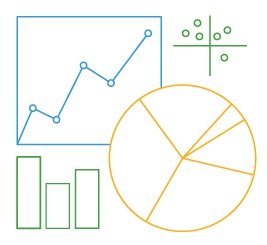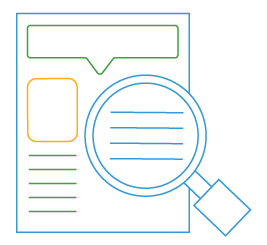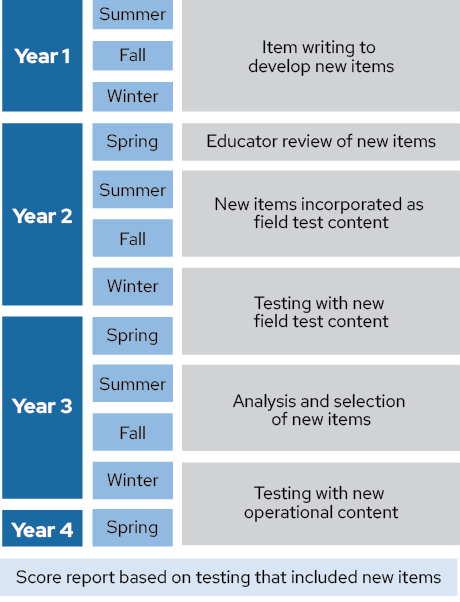Building a WIDA Assessment
Discover what it takes to make a high quality assessment
WIDA assessments are built on a strong foundation of research. We partner with top experts in the field to design and maintain our tests. We also work with educators from around the world to ensure our tests are informed by best practices in the day-to-day education of multilingual learners.
WIDA assessments are standards-referenced tests, meaning that student performance is compared to the WIDA ELD Standards Framework. Any student can achieve any score, and students are not ranked against each other or against the expected performance of monolingual English speakers.
Continue reading below about:
- Key activities in the test development process
- Educator involvement in test design
- Milestones in the test item development cycle
Test Development Process
Test development work varies from test to test and year to year. These are some key steps that typically occur between an initial concept and the final assessment you use.


Write test items and create artwork
Item writers work with our partners at the Center for Applied Linguistics (CAL) to create new test content aligned to the WIDA English Language Development Standards Framework and based on educator-recommended topics and themes. CAL’s design team creates unique graphics to support these new items and WIDA staff reviews, refines and approves the new content. WIDA staff also ensure test items are accessible to students with a wide range of abilities and learning needs by applying universal design principles. Visit the Accessibility and Accommodations page to learn more about testing support.

Review by WIDA community
To ensure new test content is appropriately vetted, WIDA coordinates several review activities and events. These activities and events can include such things as reviews of test content and field testing.

Analyze data
Psychometricians, who are trained experts in measuring the validity and reliability of an assessment, investigate how the new test content performed during field testing.

Finalize the assessment
WIDA assessment experts determine which field-tested items continue as scored pieces of an assessment. Before testing begins, WIDA staff thoroughly check the final version of the assessment and hear input from consortium member leaders before the assessment is administered to students.
Educator Involvement
Educator involvement varies from test to test and year to year. These are some of the key activities that educators, from state-level administrators to classroom teachers, participate in to help WIDA make the tests and teaching tools students and teachers around the world rely on.
Want to participate in an assessment event? Browse the events below to learn more about each event. If WIDA is actively recruiting for a specific event, that event description will include a link to a participation survey. Fill out relevant surveys to be considered for each event.
Want to be considered for more than one WIDA assessment event? Fill out the annual assessment event participation survey. WIDA will contact selected participants on a rolling basis throughout the 2025-26 school year.
Want to be considered for a WIDA alternate assessment event? Fill out the WIDA alternate assessment event participation survey. For these events, we are looking for educators who have experience working with multilingual learners with the most significant cognitive disabilities. WIDA will contact selected participants on a rolling basis throughout the 2025-2026 school year.
- WIDA ACCESS for Kindergarten Audio Recordings and Observations
Between December 1, 2025 and February 20, 2026, WIDA and Center for Applied Linguistics (CAL) staff members would like to come to your school to observe, and audio record your actual, scheduled WIDA ACCESS for Kindergarten test administrations.
All sites that participate will receive $100 per participating student.
Recruitment for this event is closed. WIDA has been in touch with selected participants.
- ACCESS Online Listening and Reading Post Field Test Review
Each spring, WIDA and the Center for Applied Linguistics (CAL) conduct a Post Field Test Review meeting. The purpose of the meeting is to review the statistics and the content of ACCESS Online Listening and Reading items that were field-tested in the preceding operational testing cycle. You will be asked to apply your classroom experience to determine whether items with borderline statistical profiles are appropriate, from a content perspective, to appear operationally in the next administration of ACCESS Online.
- Bias, sensitivity and content reviews
Educators review test items for authenticity and grade-level appropriateness. Reviews suggest revisions that better align the test content to the WIDA ELD Standards Framework. This activity typically occurs annually in summer.
Reviewers ensure test items are free of material that might favor any subgroup of students over another on the basis of gender, race or ethnicity, disability, home language, religion, culture, region, or socio-economic status. Reviewers also ensure test items are grade-level appropriate and factual. There are two Bias, Sensitivity, and Content Reviews. This review for the Listening, Speaking and Reading domains typically occurs annually in spring. The review for the Writing domain typically occurs annually in fall.
- Classroom observations
WIDA staff observe students and educators as they complete test content in development. Observers then interview participants to learn how they reacted to and thought through the items and tasks. This activity helps WIDA staff refine test questions and clarify test administration guidance. This activity is conducted as needed.
- Cognitive labs
The purpose of a Cognitive Lab (cog lab) is to administer selected items and tasks in development to representative students, so we may identify any areas of concern with the test content. While the student is responding to the test items/tasks, she/he will be observed, and the cog lab will be followed by an interview with the student and the test administrator. Feedback from the observations and interviews will be used to improve the test items/tasks. This activity is conducted as needed.
- ELD Standards Framework expert review
Educators review test items for authenticity and grade-level appropriateness. Reviews suggest revisions that better align the test content to the WIDA ELD Standards Framework. This activity typically occurs annually in summer.
- Field tests, pilot tests, tryouts
Educators and students interact with test content in development in the context of a full assessment experience. The in-development content doesn’t result in or contribute to student scores. These activities help WIDA staff understand whether the new test content is accurately assessing English language proficiency. These activities are conducted as needed, but all new content goes through this step as it is developed.
- Online Forms reviews
State-level administrators will be asked to go through an entire test, item by item, to identify errors or inconsistencies introduced during the final assembly of the test. Critical errors are corrected immediately, and additional feedback guides future test development.
- Theme generation
Test developers will recruit groups of educators from across the consortium to solicit their help with brainstorming theme ideas for new ACCESS domain tasks. This activity is an important early step for creating high-quality content for the ACCESS tests.
- Special project events
Throughout the year, WIDA hosts special project events including test-specific cognitive labs, pilot testing, field testing, and validation studies. WIDA will send out email and social media messages in advance of hosting one of these events.

What participants said...
“I thought this was a very valuable insight into not only how the test was made, but also the very detailed thought process that is used when reviewing questions. It is something I will keep in mind when not only preparing my students for WIDA, but also making my own lesson plans.”
– 2025 WIDA ACCESS Bias, Sensitivity and Content Review (Writing) participant
“It was helpful to see what 'content topics' other Kindergarten educators across the country are teaching. Also, this was a good way for me to better internalize the WIDA Language Standards and Expectations, so I can apply them in my school setting.”
– 2022 Kindergarten ACCESS for ELLs Theme Generation participant
“I enjoyed seeing the process of how WIDA puts together testing material. I also really appreciate knowing that test items are reviewed ahead of time to look for content, bias, and sensitivity. I really had the best experience and wouldn't mind participating again.”
– 2025 WIDA ACCESS Bias, Sensitivity and Content Review (Listening, Reading and Speaking) participant
Test Item Development Cycle

Creating new content for WIDA assessments is an intensive, multi-year process. Consider a typical ACCESS development cycle. Initial item writing begins in the summer and continues through the end of the calendar year. Item reviews typically take place in the spring.
By fall, the new items have been incorporated into the assessment as field test items. They appear to students just like regular test content, but they do not contribute to the test scores.
Items that don’t work well are saved for revision and repurposing. Items that do work well are incorporated into the test and become operational. In other words, the next time a student sees the item, it will contribute to the test score.
A test item developed in calendar year 1 will help provide a score that an educator sees in summer of calendar year 4.
The table here shows the test development cycle over the course of four years. In year one, from summer through winter item writing to develop new test items takes place. In the spring of year two, there is an educator review of new items. In the summer and fall of year two, new items are incorporated as field test content. In the winter of year two and sprint of year three, there is testing with new field test content. In the summer and fall of year three, analysis and selection of new items happens. In the winter of year three and spring of year four, there is testing with new operational content. Then the score reports are based on testing that included new items.
Test Item Refreshment
The steps of the test development process happen every year. However, not every WIDA assessment is rebuilt from scratch every year. To accurately calculate scores and compare student performance, some test items and tasks in the current year need to be the same as those in the previous year. It’s also a big project to create new test content – so we keep what works!
Test developers aim to replace items that are older and that could be improved, according to established guidelines on how much test content should change. For example, about one third of the ACCESS Online Listening and Reading content is refreshed each year.
Standards Update
Test development is always happening, but updates to the WIDA English Language Development Standards Framework are undertaken only periodically. When a new edition is released, WIDA stakeholders have a chance to learn about the standards and integrate the new edition into local curriculum, instruction, and assessment policies before the tests are updated. It can be a few years before WIDA delivers tests and resulting score reports that are grounded in new standards.




